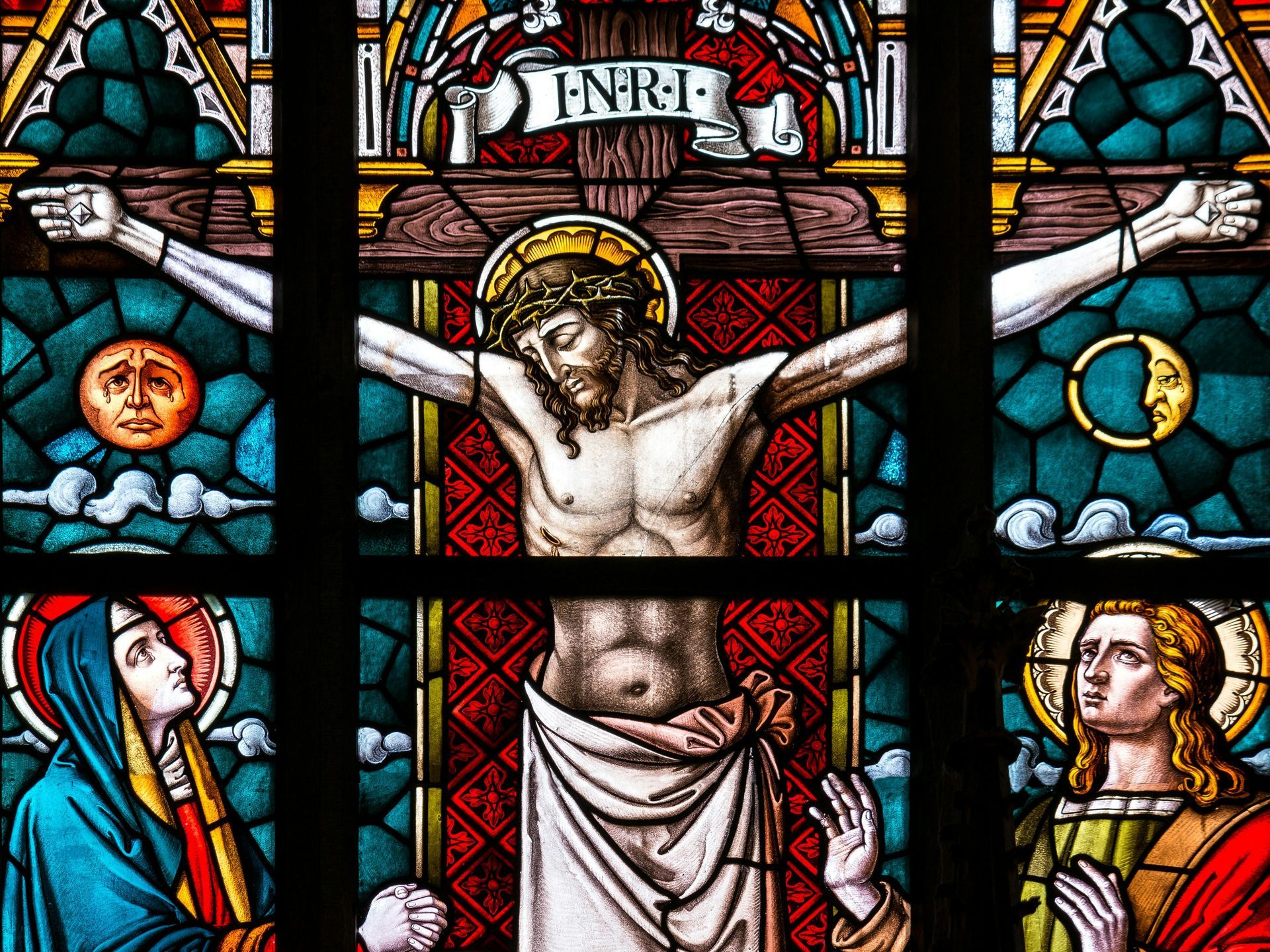Bylsma’s Bible Blogs
#7 Main Themes Of The Bible

Whenever an author plans to summarize a vast amount of complicated material, the first step is to identify the common themes and messages. Once these are identified, the themes and messages need to be woven together into a narrative that flows naturally from a beginning to the end. A story that is filled with unnecessary details and not organized properly strains a reader to understand and retain the content, and it limits a reader’s ability to understand what the author means to convey.
The 66 documents that were combined into one book, the Bible, has a beginning that moves progressively to a conclusion. None of the documents tell the entire story, but collectively, they build on many common themes. Despite their diversity, the documents all contribute to a plot that centers on the nature of God and the invisible and enduring conflict between the spiritual forces of good and evil in the world.
Besides this central plot, the Bible contains a number of unifying themes that run from the beginning to the end. Here is a list of the themes.
- The world has two planes of reality — one that is physical and can be seen and measured, and another that is invisible, supernatural, and spiritual that cannot be measured empirically.
- Invisible forces have unusual powers. Some forces have good and loving motives, but others have evil motives that destroy what is good.
- There is only one true and supreme force (God) that has different forms. Some people believe there are other gods, but these don’t have the characteristics or power of the true God.
- There is life after physical death, and the quality of one’s life after death depends on God’s decision regarding the life a person leads when they are alive. God’s forgiving and gracious nature gives hope that everyone has the possibility of entering some form of a heavenly afterlife.
- God is good, just, merciful, forgiving, loving, and gracious. God wants people to live life abundantly and gives people far more than what they deserve (grace). God’s mind can change from judgment to forgiveness and healing when hearing people’s earnest appeals (prayers).
- God chooses people to show the world how life and relationships should look on earth. At first, God worked through individuals and families, then through a special tribe of people (the Jews of Israel) that was chosen in one area of the world. An assortment of people provided special messages to this tribe to remind them how they should live. Eventually, people throughout the entire world were adopted to be God’s people. These people are to exhibit specific qualities that distinguish them from others — they are to be known by their love for others and by their provision of and advocacy for justice.
- God wants to maintain relationships with all people without regard to their actions, beliefs, gender, tribe, race, age, or birthplace, even when they don’t obey. The gradual increase in the revelation of God’s character and desires for the world reveals a movement from exclusiveness to inclusion.
- There are right and wrong ways to live, things to do and things to avoid. Obedience to God’s principles and guidance helps us through life’s struggles in a world filled with evil. Not following these principles may result in more severe struggles and separation from God. Great effort is needed for good to overcome evil, but with God’s help, personal transformation and change are possible, and good can prevail.
- God’s people often fall away from living the right way. As a result, they suffer the consequences of their disobedience, including a refining process that reduces their numbers and brings them much pain. But a remnant of God’s people always remains to continue the mission to communicate the loving nature of God and how we should live in harmony with God and each other.
- Some form of offering or sacrifice is needed to restore a broken relationship. Blood symbolizing life were sometimes used in offerings and sacrifices to acknowledge that we have fallen short of expectations and that we must forego our interests to make matters right. However, these symbolic gestures are only outward expressions and don’t automatically communicate a changed heart. God looks for a changed heart that is shown by obeying God’s commands and treating others with justice, mercy, and love.
- Life is complicated and often unfair. In a world that has both good and evil, everyone suffers. While many people get what they deserve, good people may suffer and evil people may thrive. Faithfulness to God and our response to our circumstances are what matter the most, especially during times of trial and when tempted by evil. God’s unlimited love, forgiveness, and grace are wonderful gifts to all people, even though we don’t deserve them.
- God is very concerned about justice and helping those who are disadvantaged. God is especially passionate about helping foreigners and the sick, poor, abandoned, despondent, and disenfranchised. Acts of service, compassion, and sacrifice for these groups provide evidence of a God-like disposition.
- A tension exists in how we live our lives on earth. We are not to conform to the ways of an ungodly world, but we are asked to serve others in that world. Some choose to separate themselves physically from anything that is ungodly while others live and work alongside those with other value systems while practicing godly principles. Each of these two forms of resistance and approaches to bring “salt and light” to the world has its own benefits and dangers.
- God’s principles and guidance often contradict prevailing earthly values and priorities. The paradoxes and counterintuitive nature of biblical teachings are at the heart of some of the more difficult actions God wants people to follow. For example, loving your enemy may not make sense, but it is required of those who follow God. Dependence on God and the faith community is more important than personal independence and self-sufficiency. Allegiance to God is more important than national patriotism and following cultural norms. Being a humble servant is more important than attaining power. The pursuit of happiness by any means other than being centered in God’s ways will not satisfy humans’ deepest needs.
The Nature of God
An analysis of the Bible’s content reveals that the noun used most often is “God.” The Hebrew term God is a plural noun that is defined as a powerful force that has different forms, similar to how elements and compounds have different forms (solid, liquid, gas). The term Lord is used in the biblical writings as another word for God. The different terms for God were typically masculine pronouns (he, his, him) or the term Father. However, God is not a masculine deity and is neither male nor female. As a multidimensional force, God created both male and female humans in God’s own “image,” which means people are able to distinguish between right and wrong, possess a soul, have self-consciousness and awareness of our surroundings, are able to have meaningful relationships with God and others, and are willing to love others in a sacrificial way. This sets humans apart from other living things.
God’s Communication Methods
God communicates with humans in many different ways. Although the events described in the Bible took place many centuries ago, there is ample evidence that God communicated with people in all these ways throughout history and does so even today.
1. The awesome beauty of the universe and its predictable cycles and “laws of nature” have inspired humans to see the planet and the worlds beyond as an orderly and beautiful creation that is not randomly designed.
2. God communicates by way of God’s “Spirit” form, which influences the human mind and emotions and provides direction to humans about their moral choices related to right and wrong.
3. When humans take time to listen and seek direction, communication can occur through divinely inspired insights and an inaudible “small voice” in the mind.
4. Sometimes communications are more direct — through dreams, visions, or messages from angels or “holy strangers.”
5. On rare occasions, God disrupts the normal laws of nature to intervene directly in human activities, and God sometimes intervenes using rare natural events at strategic times. These obvious deviations in how the world normally works as well as the timely coincidences are called “miracles.”
6. Sometimes humans themselves are inspired or “possessed” by the Spirit to speak the words of God to others in extraordinary and convincing ways.
7. Other believers can provide godly advice and rebuke others by using their “spiritual gifts.” There are many such gifts. For example, a prophet is somebody who is gifted to speak God’s thoughts and teachings to others. (A false prophet is somebody who speaks with authority but misrepresents the truth and God’s messages to others.)
8. The Bible itself is available to study so we can learn about God’s ways long after the events occurred. In most cases, the biblical documents were written long after the events occurred but were based on eyewitness accounts or were passed on by word of mouth from generation to generation using the oral traditions of the time. The messages of the Bible are reliable and still relevant.
9. Finally, God took on a human form and lived on earth, giving us the most concrete example of how we are to live and love one another.
God Can Be Unpredictable
God uses many different strategies and tactics to meet the overall goal of showing the world how to live and how God intervenes in human history. Many characters in the Bible speak for God, and some of them act and speak in unusual and bizarre ways. Punishment comes in different forms, sometimes in unexpected ways, including letting evil forces administer the punishment. Different types of miracles occur. While the intrinsic nature of God does not change, God’s methods are unpredictable and often changing.
This makes life itself unpredictable. We often don’t understand why things happen — God’s ways are not our ways, God’s timing is not our timing. When good and evil forces coexist and God gives people freedom to choose their own way, crises will occur. But the crises of life can be used for good — they test and deepen our character, build our stamina and grit, focus our priorities, and help us empathize with others who suffer. Darkness is followed by light for those who endure. As dark shadows provide depth in beautiful paintings and diamonds are created under prolonged pressure and then carefully chiseled and polished by a master jeweler, humans are developed and shaped in difficult times. But for those who love God, all things work out for good, either in this life or the next. Death is a comma, not a period, in a life that has no end.
Bylsma’s Bible Blogs











